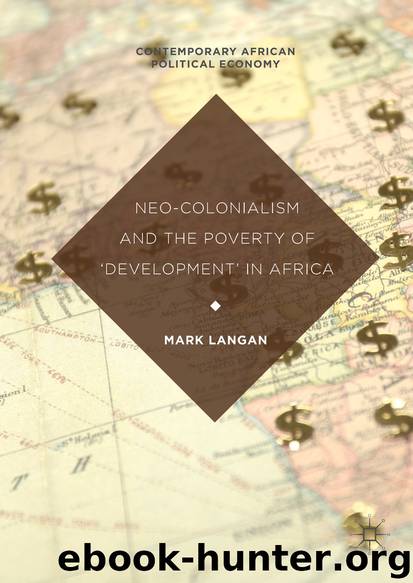Neo-Colonialism and the Poverty of 'Development' in Africa by Mark Langan

Author:Mark Langan
Language: eng
Format: epub
Publisher: Springer International Publishing, Cham
History of Africa’s ‘Association’ with the European Union
African countries have been ‘Associated’ with the European supranational project since the inception of the EEC under the Treaty of Rome in 1957. French diplomats—as part of their negotiations with other would-be EEC member states such as West Germany —insisted that then French colonies in Africa should be granted preferential terms of trade with the Common Market (Kawasaki 2000; Brown 2002). They insisted that joint European aid agencies should also be constructed to share the costs of development in Francophone Africa. France was successful in its insistence upon this Association between the EEC and its African territories. As a result, France’s African colonies did receive low tariff access to the European market as compared with British African possessions (at that time outside of the Association arrangements since the UK did not join as a founding member in 1957). The European Development Fund (EDF) was also established to pool European aid monies for collective projects in the African territories (Van der Lee 1967: 198; Fredrichs 1970: 246).
Importantly, however, there soon came a push for ‘reciprocal’ free trade arrangements as this explicitly colonial relationship gave way to the era of decolonisation. Under the Yaoundé Accords (1963–1975) between the EEC and the Associated African States and Madagascar (AASM) , European officials pushed for gradual tariff liberalisation on the part of the AASM group. AASM exporters would maintain their preferential access to the Common Market as compared with non-Associated developing countries. Nevertheless, they themselves would have to ensure that European exporters, in return, would be able to access the AASM bloc’s consumers as part of reciprocal free trade arrangements (Brown 2002: 42). Meanwhile, EDF monies grew in terms of per capita contributions to AASM ‘development’ despite early controversies such as European aid towards ‘white elephant’ infrastructure projects (Robson 1965; Soper 1965). Even at this early stage of Association, many commentators queried whether reciprocal free trade and EDF monies would promote development per se, or instead lock-in poorer states into (neo)colonial patterns of trade and production (Ogikbo cited in Soper 1968; Nkrumah 1963; Touré 1962).
Significantly, this reciprocal free trade arrangement was replaced by the Lomé Conventions (1975–2000) which—at least in their first iteration—were inspired by the UN debates for a New International Economic Order (NIEO) . Informed by the dependency school’s critique of asymmetric trade and aid arrangements, the first Lomé Convention ostensibly sought to usher in a more egalitarian partnership between the EEC and the newly constituted African, Caribbean and Pacific (ACP) group (Zartman 1976; Gruhn 1976, 1993). The ACP bloc—with Francophone and Anglophone African states now united in a single negotiating entity following the UK’s accession to the EEC—successfully pushed for NIEO-style concessions. Most notably, the first Lomé Convention promised that trade would be non-reciprocal, in the sense that there would not be pressure laid upon ACP economies to undertake tariff dismantling. EEC officials nominally recognised that African states might retain tariffs to protect their own emerging sectors while their competitive muscle grew. In addition, the
Download
This site does not store any files on its server. We only index and link to content provided by other sites. Please contact the content providers to delete copyright contents if any and email us, we'll remove relevant links or contents immediately.
| Arms Control | Diplomacy |
| Security | Trades & Tariffs |
| Treaties | African |
| Asian | Australian & Oceanian |
| Canadian | Caribbean & Latin American |
| European | Middle Eastern |
| Russian & Former Soviet Union |
The Secret History by Donna Tartt(19088)
The Social Justice Warrior Handbook by Lisa De Pasquale(12190)
Thirteen Reasons Why by Jay Asher(8910)
This Is How You Lose Her by Junot Diaz(6887)
Weapons of Math Destruction by Cathy O'Neil(6280)
Zero to One by Peter Thiel(5802)
Beartown by Fredrik Backman(5754)
The Myth of the Strong Leader by Archie Brown(5508)
The Fire Next Time by James Baldwin(5446)
How Democracies Die by Steven Levitsky & Daniel Ziblatt(5219)
Promise Me, Dad by Joe Biden(5153)
Stone's Rules by Roger Stone(5088)
A Higher Loyalty: Truth, Lies, and Leadership by James Comey(4964)
100 Deadly Skills by Clint Emerson(4925)
Rise and Kill First by Ronen Bergman(4789)
Secrecy World by Jake Bernstein(4753)
The David Icke Guide to the Global Conspiracy (and how to end it) by David Icke(4720)
The Farm by Tom Rob Smith(4513)
The Doomsday Machine by Daniel Ellsberg(4490)
